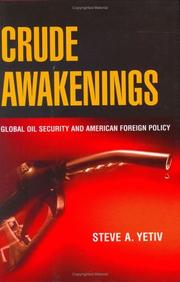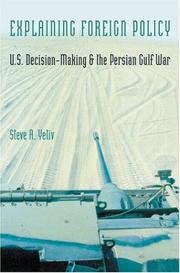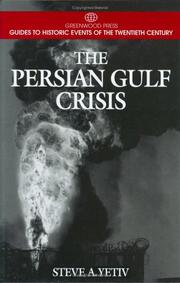| Listing 1 - 8 of 8 |
Sort by
|

ISBN: 0801442680 0801459427 0801458188 080147650X Year: 2004 Publisher: Ithaca ; London Cornell University Press
Abstract | Keywords | Export | Availability | Bookmark
 Loading...
Loading...Choose an application
- Reference Manager
- EndNote
- RefWorks (Direct export to RefWorks)
"The real story of global oil over the past twenty-five years is not about the spillover effects of Palestinians fighting Israelis, or terrorist attacks on U.S. forces in Saudi Arabia and Yemen, or Iraq's stormy relationship with Kuwait. It is not even about periodic small- and large-scale U.S. attacks on Iraq. Rather, the real story is about longer-term developments that have changed the international relations of the Middle East, politics at the global level, and world oil markets. These developments have increased oil stability."-from the Introduction Thirty years after OAPEC shattered world markets for oil, the Western world remains profoundly dependent on foreign, particularly Middle Eastern, sources of petroleum. U.S. political rhetoric is suffused with claims about the vulnerability caused by this dependence. Hence, many political analysts assume that a search for stability of petroleum supplies is an important element of contemporary American foreign policy. Steve A. Yetiv argues that common assumptions about oil markets are wrong. Although prices remain volatile, Yetiv's account portrays a world market in petroleum products far more benign and predictable than the one to which we are accustomed. In Crude Awakenings, he identifies and analyzes real and potential threats to the global energy supply, including wars, revolutions, coups, dangerous alliances, oil embargoes, Islamic radicalism, and transnational terrorism. However, he also shows how some of these threats have been mitigated and how global oil security has been reinforced.
Collectieve veiligheid --- Collective security --- International security --- Security [Collective ] --- Security [International ] --- Sécurité collective --- Sécurité internationale --- Veiligheid [Collectieve ] --- Middle East --- Foreign relations --- United States --- Petroleum industry and trade --- Saudi Arabia --- Politics and government --- 1932 --- -Middle East --- -Security, International. --- Security, International. --- -Petroleum industry and trade --- International relations --- Disarmament --- International organization --- Peace

ISBN: 080187811X Year: 2004 Publisher: Baltimore London Johns Hopkins University Press
Abstract | Keywords | Export | Availability | Bookmark
 Loading...
Loading...Choose an application
- Reference Manager
- EndNote
- RefWorks (Direct export to RefWorks)
Persian Gulf War, 1991 --- Causes. --- Diplomatic history. --- Causes --- Diplomatic history --- United States --- Foreign relations --- 1989-1993

ISBN: 0313299439 0313008183 9780313008184 9780313299438 9798400696237 Year: 1997 Publisher: Westport, Conn. ; London Greenwood Press
Abstract | Keywords | Export | Availability | Bookmark
 Loading...
Loading...Choose an application
- Reference Manager
- EndNote
- RefWorks (Direct export to RefWorks)
Book
ISBN: 0190212713 0190212705 9780190212704 9781322980157 1322980152 9780190212698 0190212691 Year: 2015 Publisher: New York
Abstract | Keywords | Export | Availability | Bookmark
 Loading...
Loading...Choose an application
- Reference Manager
- EndNote
- RefWorks (Direct export to RefWorks)
The last decade has seen a far-reaching revolution in the oil industry, both in the US and globally. By some measures, America is on pace to become the world's biggest oil producer, an outcome that was inconceivable just a few years ago. But what does this shift really mean for American and global security? In Myths of the Oil Boom, Steve A. Yetiv, an award-winning expert on the geopolitics of oil, takes stock of our new era of heightened petroleum production and sets out to demolish both the old myths and misconceptions about oil and the new ones that are quickly proliferating. As he explains
Petroleum industry and trade --- National security --- Political aspects
Book
ISBN: 9780190212698 Year: 2015 Publisher: New York [etc.] Oxford University Press
Abstract | Keywords | Export | Availability | Bookmark
 Loading...
Loading...Choose an application
- Reference Manager
- EndNote
- RefWorks (Direct export to RefWorks)
Book
ISBN: 9780801887819 Year: 2008 Publisher: Baltimore Johns Hopkins University Press
Abstract | Keywords | Export | Availability | Bookmark
 Loading...
Loading...Choose an application
- Reference Manager
- EndNote
- RefWorks (Direct export to RefWorks)
Book
ISBN: 0801463408 0801463394 Year: 2011 Publisher: Ithaca : Cornell University Press,
Abstract | Keywords | Export | Availability | Bookmark
 Loading...
Loading...Choose an application
- Reference Manager
- EndNote
- RefWorks (Direct export to RefWorks)
In The Petroleum Triangle, Steve A. Yetiv tells the interconnected story of oil, globalization, and terrorism. Yetiv asks how Al-Qaeda, a small band of terrorists, became such a real and perceived threat to American and global security, a threat viewed as profound enough to motivate the strongest power in world history to undertake extraordinary actions, including two very costly wars.Yetiv argues that Middle East oil and globalization have combined to augment the real and perceived threat of transnational terrorism. Globalization has allowed terrorists to do things that otherwise would be more difficult and costly: exploit technology, generate fear beyond their capabilities, target vulnerable economic and political nodes, and capitalize on socio-economic dislocation. Meanwhile, Middle East oil has fueled terrorism by helping to bolster oil-rich regimes that terrorists hate, to fund the terrorist infrastructure, and to generate anti-American and anti-Western sentiments about American support for oil-rich regimes and perceived Western designs on Middle East oil. Together, Middle East oil and globalization have combined in various ways to help create Al-Qaeda's real and perceived threat, and that of its affiliates and offshoots. The combined effect has shaped important contours of the Petroleum Triangle and of world affairs.A sweeping analysis of contemporary world politics and American foreign and military policy, The Petroleum Triangle convincingly argues that it is critical to understand the connections among oil, globalization, and terrorism if we seek to comprehend modern global politics. What happens within the Petroleum Triangle will help determine if the death of Osama bin Laden will ultimately cripple Al-Qaeda and its affiliates or be yet another milestone in an ongoing age of terrorism.
Petroleum industry and trade --- Terrorism --- Globalization --- Political aspects. --- Political aspects --- Economic aspects.
Book
ISBN: 080188781X 0801887828 0801896878 Year: 2008 Publisher: Johns Hopkins University Press
Abstract | Keywords | Export | Availability | Bookmark
 Loading...
Loading...Choose an application
- Reference Manager
- EndNote
- RefWorks (Direct export to RefWorks)
| Listing 1 - 8 of 8 |
Sort by
|

 Search
Search Feedback
Feedback About UniCat
About UniCat  Help
Help News
News